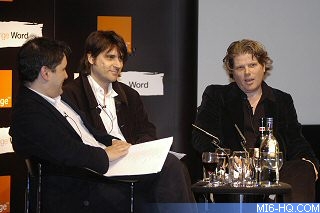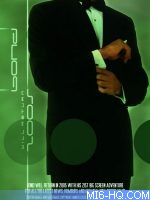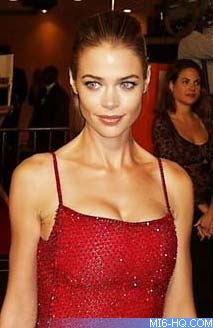 |
| |
MI6 got to attend "The Orange Word"
Screen Writers Season 2004, and can bring you the
full transcript from the interview. In this in depth
talk Neal Purvis and Robert Wade discuss Bond, their
careers, loves and pet hates of film...
|
|
Interview - Neal Purvis and Robert Wade (5)
27th May 2004
MI6 got to attend "The Orange Word" Screen Writers
Season 2004, and can bring you the full transcript from the interview.
In this in depth talk Neal Purvis and Robert Wade discuss Bond,
their careers, loves and pet hates of film...
Continuing floor questions...
Floor Question Six: As a follow on from what you said
there, to what extent is the next Bond and any other Bonds you're
might do going to be limited by the fact that in its simpler sense,
it's all been done, because you talked about having the possibilities
to do what you like, is it hard to think of things that are genuinely
original when it comes to the next films?
Robert Wade: I mean I don't think there's a more difficult
task because it's all been done, it's been done 20 times. I think
the 20th one was more difficult to do than the 19th, do you think
so?
Neal Purvis: Yeah and I mean the 20th because it was
a sort of a celebration of previous Bonds really mined and reinforced
all the things that you're familiar with in Bond and so the next
one I think it would be good to step away as far as you could,
whilst as I said about keeping Ian Fleming in there as much as
you can but you do want to change it.

Above: Left to right Peter Florence,
Neal Purvis and Robert Wade. |
|
Robert Wade: It's very difficult to think of new
ways of blowing things up you know, and we spend a lot of
time just thinking about that, and it's terrible. No it's
the character that is the thing, it's finding a new journey
for the character and then all of that other stuff sprouts
from that.
I feel that The World is Not Enough, the action in that
movie wasn't as, didn't spring from the characters as much
as the action in Die Another Day and I think that is a very
bizarre thing to be thinking about because we never ever
thought about that in the previous films that we were working
on. |
Anything, you're not thinking about having to fulfil an audiences
expectations but this is very strange.
Floor Question Seven: You mentioned that you don't like
writing for television, I'm just wondering, that Hollywood has
a great tradition of taking old and forgotten TV series and making
populist entertainment from it. I'm wondering if there's anything
on British TV that you'd like to see up on screen or you feel
that you could write?
Robert Wade: They did the Likely Lads film.
Neal Purvis: Steptoe and Son Rides Again.
Robert Wade: Yeah and Porridge as well, so it's all
been done really
Neal Purvis: I can't think of anything that eh…
Robert Wade: We're not against writing for TV it's just
that we just didn't do that, we sort of went off into a tangent
which was moribund for a long time but I mean what happens is
that people do take things … there's someone we know who
sees a good thing on British TV and immediately buys up the story
writes and sells it to American studios you know, and we're trying
to learn how to be businessmen in that way but we haven't managed
that.
Neal Purvis: No, he's always there first isn't he?
Neal Purvis: Yeah, he's probably watching TV now you
know.
|
Floor Question Eight: There was a rumoured Halle
Berry film that you were working on as a spin off from James
Bond, what happened to that?
Peter Florence (Chair): This is Jinx isn't it?
Robert Wade: Yeah which we ended up spending two
months working with Stephen Frears on which was highly enjoyable
and he's a really, really good director and it's all down
to the studio just at the very last minute … Halle
Berry was very happy with the film, the producer seemed
to be happy and Stephen Frears was happy and we were happy
but the studio just didn't want to make it at the very last
minute and I think it was going to cost about $80m or $90m
and Charlies Angels hadn't done very well and Tomb Raider
hadn't done very well so maybe it was they didn't want the
female led action movie, but it was extremely disappointing
for us because we'd put so much into that film.
Neal Purvis: And yet it was sort of in that movie,
in Die Another Day, our sort of concept for her character
was that she, was trying to think that this woman had stepped
out of her own movie series into James Bond's world and
it was ironic then that the studio asked us to try and create
a movie series for that character.
Peter Florence: Sorry, what do you mean, your
concept?
Neal Purvis: Well we thought to make her sort
of different from your average Bond girl, think of everything
that she does and the way that she behaves and just her,
everything that comes with her as if she's stepped out of
her own movie into James Bond's film.
|
|
'...our
thing was that [Jinx] was completely naked... we were just
completely disgusted by that sequence....'
Above: Die Another Day, Jinx Character
Portrait (2002)
 Buy
Now £12.99
Buy
Now £12.99
|
Peter Florence: Except that the two things that one
thinks of her immediately doing are straight rips offs of Pussy
Galore and Ursula Andress.
Robert Wade: I hadn't noticed.
Peter Florence: The diving backwards off the thing and
then coming…
Robert Wade: Oh well I don't know about the diving backwards
thing but the walking up the beach, that was a little, I think
our thing was that she was completely naked so…
Neal Purvis: Which was true to the book.
Robert Wade: Yeah.
Neal Purvis: So creatively we were just completely
disgusted by that sequence.
Robert Wade: Yeah and we had to hold ourselves back,
but no what I meant by that is that we were thinking well imagine
if you're in a normal film and James Bond walks into it, you'd
think that's a very, that guy's not normal and that was the sort
of concept behind Jinx so it was just ironic that then they wanted
to make her own movie series because it was a sort of reverse
prophecy but it didn't happen.
|
'We have started
writing the new one but we've only been writing it for about
two weeks...'
Floor Question Nine: I have a two part question,
but briefly I was wondering had you started work on Bond
21 and if so, obviously can you tell us anything about it?
Secondly I was wondering given that when you know who's
going to be playing a character as with Pierce Brosnan in
James Bond, does that change the way you write, do you write
to his strengths or do you pretty much write for the character
and make him do whatever you want?
Peter Florence: Come on cut to the chase here,
you want to know who the new Bond is?
Robert Wade: Well I can reveal tonight that he's
sitting next to me.
Neal Purvis: We have started writing the new one
but we've only been writing it for about two weeks, so everything
is in place.
|
|

Above: MI6 Bond 21 Teaser Banner
|
Robert Wade: All the clichés have been worked
out to a fine um…
Peter Florence: Are you aware of the fact, since you
are sensitive to public opinion, that the worlds biggest anxiety
is George Bush? Well most people are more worried about him than
they are about anybody else.
Robert Wade: Well you know, I mean you obviously didn't
watch Die Another Day closely enough…
Peter Florence: Okay, run this by me.
'as far as we understand
it Pierce Brosnan is Bond …'
Neal Purvis: … I mean what one, in a sense the
whole kind of idea behind that film was disguised by the way the
film ended up but it was about a kind of reaction to American
dominance of the planet and that's what the Korean maniac is actually
doing, he's actually striking back against America. So you do
try to think of what's the governing angst in the world but you're
suggesting that George Bush should be the villain in the next
movie. You see that would make it like a Clancy movie.
Floor Question Ten: She asked the first half of my question
and you didn't really answer the second half, which was who are
you writing Bond for right now?
Robert Wade: For ourselves.
Floor Question Ten: So you're both going to play him.
Peter Florence: Bond is going to be played by two people
in this.
Neal Purvis: No I mean as far as we understand it Pierce
Brosnan is Bond …
Robert Wade: He's a great Bond and he gives you a lot
to work with as a writer I think because he's very, he's very
good looking but also he does have this kind of ability to …
if you give him an emotionally loaded context to act within he
can suggest this kind of depth and that's as far as you can go
in a Bond movie. I don't know, but I don't want to see a James
Bond film where he's kind of you know all uncertain and worried
about things and he doesn't know what to say. We want this character
to be as good as we can be I think.
Peter Florence: Do you have to sign a sort of contract
to say that you will not discuss at any point what is going to
happen?
|

|
|
Neal Purvis: We might be screwed if we had. Have
you signed one of those?
Robert Wade: No, I don't think so.
|
Neal Purvis: No but I mean it's very difficult because
unlike other things, what you say will end up on the internet
and then it will end up in a newspaper so you know you have to
be slightly circumspect.
Robert Wade: Yeah there's a bad thing where stuff on
the internet just gets taken and it just gets swallowed by the
newspapers, so it's not that harmless.…
|

Above: Denise Richards (Dr. Christmas
Jones)
|
|
Floor Question Eleven: Do you
get a chance to put anything personal in a Bond film? Are
there little 'in' jokes that you've put in? I think I read
once you said that Christmas Jones, Christmas was the name
of Bentley's lawyer, which I always thought was a nice sort
of touch and the Bond films are sort of quasi-written by
committee but
Robert Wade: Well no that's just not true, that's
Neal Purvis: It's a committee of two…
Robert Wade: … that's just totally not true
and …
Neal Purvis: … and you'll find work shows
through.
Robert Wade: Pardon?
Floor Question Eleven: But are there any little
um sort of 'in' jokes that you've put in or favourite scenes
that you like in the two Bond films you've made?
Robert Wade: Well we always like to have eh…
|
Neal Purvis: Well actually I think Falco, who was the
American agent in Die Another Day, Sidney Falco was Sweet Smell
of Success, Tony Curtis but the Bond films aren't written by committee,
I don't know where you got that from. I thought, as we said, that
there must be tons of writers in a room somewhere but it's not
the case.
Robert Wade: No we haven't had any help in that respect.
Peter Florence: What about the fact that the Broccoli
family, who presumably have, beyond sort of commercial property
they have intellectual property in the whole thing, it must be
wonderful to work with that legacy mustn't it?
Robert Wade: Yeah I mean we have … it's all fun,
I mean it's difficult but it's not as difficult as some things
I suppose and they have, they have enormous knowledge about it
and they can help us steer clear of … what was it I said
the other day about the motor engine or something?
Neal Purvis: Oh attacking someone with a eh…
Robert Wade: Yeah and they pointed out that they'd done
it …
Neal Purvis: In License to Kill wasn't it?
Robert Wade: Yeah, so that was fantastic but I mean
they're very interested in the character of Bond and how do you
move it forward.
Neal Purvis: I mean they're looking for something, I
mean they're going to spend two years on it as well and they've
had all the other Bond films. They want something stimulating
for them to do, they're not doing it, you know.
Robert Wade: The thing I would say about it is that
although everyone kind of looks at it as a formula, and I can
see why, if you just looked at it in that way from inside you
would end up doing something like those other movies that are,
they say you know, I won't name any, but sort of we're going to
have a Bond villain in this thing. If you just look at it like
that you'll just end up with stuff like that we've written.
Peter Florence: We're going to end with one of the best
bits that you've written in Die Another Day, which does fulfil
my need for internal conspiracy. Would you like to just introduce
this last bit, because we thought we ought to end with a bit of
action.
Neal Purvis: Yeah forget about all the other stuff we've
talked about. It's um, Rob …
Robert Wade: Well it's where our villain, Bond has realised
who our villain is really and he's going to confront him, but
there's a little bit of Halle Berry first.
Peter Florence: Hang on, we ought to explain. How many
people here have seen Die Another Day? Okay so we don't need to
explain who the villain thing is to you.
Robert Wade: Well he's really a North Korean maniac,
but he's had gene therapy that's turned him into a British maniac,
is that fair?
Neal Purvis: Yeah, no that was very good.
Peter Florence: Can I just say, in terms of the action
scenes, what do you write, because there must be, you know there's
Vic Armstrong and 100 people from the action unit who've worked
on a number of Bond films, do you write 'Pearce falls through
the floor and runs away and gets away' or?
Robert Wade: Yeah I don't think that, it's no different
from any other film where if you don't come up with the context
for things to happen nothing will happen. It's …
Neal Purvis: We write a version of what happens and
then they do it the way they want to do it, but …
|
'...our original
thing was the Dome collapses like there's the sort of cords
holding it up get cut and it sort of goes 'plurr'...
Robert Wade: It's what happens with any kind of a movie.
Neal Purvis: In that instance, I mean we wrote
the whole of that, as it happens, but I mean the Thames
chase we wrote a version of that but we didn't necessarily
say he goes up a canal the wrong way and goes through a
shed and in front of a bus.
|
|

Above: The British Library
|
Peter Florence: What did you write, I'm fascinated?
Neal Purvis: Well we wrote�
Robert Wade: It's very boring writing that stuff so
you sort of put it down in �
Neal Purvis: I mean he goes along and he goes off and
he goes that way and �
Peter Florence: He goes along and he goes off and he
goes that way! A 12 minute, you know dynamo, the most exciting
piece of action cinema ever made.
Robert Wade: Yeah, I think we put the Dome in there
and …
Neal Purvis: The Dome, you know it fell down in the
version that we did.
Robert Wade: Yeah, our original thing was the Dome collapses
like there's the sort of cords holding it up get cut and it sort
of goes 'plurr' like that …
Peter Florence: I may say that's Moonraker pall.
Robert Wade: Well that's very erudite of you, but we
had a line in it and was Bond saying to…
Neal Purvis: No when he got saved in another version
he saved he landed on it and he said …
Robert Wade: "At least it's useful for something".
Neal Purvis: But they didn't want to do that.
Robert Wade: No.
Peter Florence: Okay so we're going to see the transformed
villain but first thanks to our very special guests Neal Purvis
and Robert Wade and to all of you for your excellent questions.
[clip of Die Another Day shown] Click
to see the trailer
Related Articles:
 Interview - Neal Purvis
and Robert Wade (Part 1)
Interview - Neal Purvis
and Robert Wade (Part 1)
 Interview - Neal Purvis
and Robert Wade (Part 2)
Interview - Neal Purvis
and Robert Wade (Part 2)
 Interview - Neal Purvis
and Robert Wade (Part 3)
Interview - Neal Purvis
and Robert Wade (Part 3)
 Interview - Neal Purvis
and Robert Wade (Part 4)
Interview - Neal Purvis
and Robert Wade (Part 4)
 MI6 "The World is Not Enough"
Coverage
MI6 "The World is Not Enough"
Coverage
 MI6 "Die Another Day" Coverage
MI6 "Die Another Day" Coverage
Many thanks to Peter Florence, Neal Purvis,
Robert Wade, Ellie Ward, The
Orange Word and The
British Library. Transcript courtesy The Orange Word. Image
courtesy Amazon Associates, Movie Market and The Orange Word